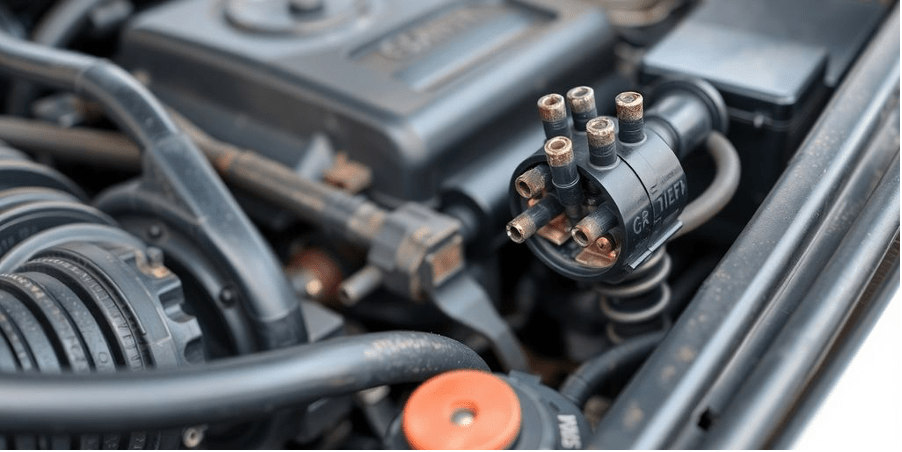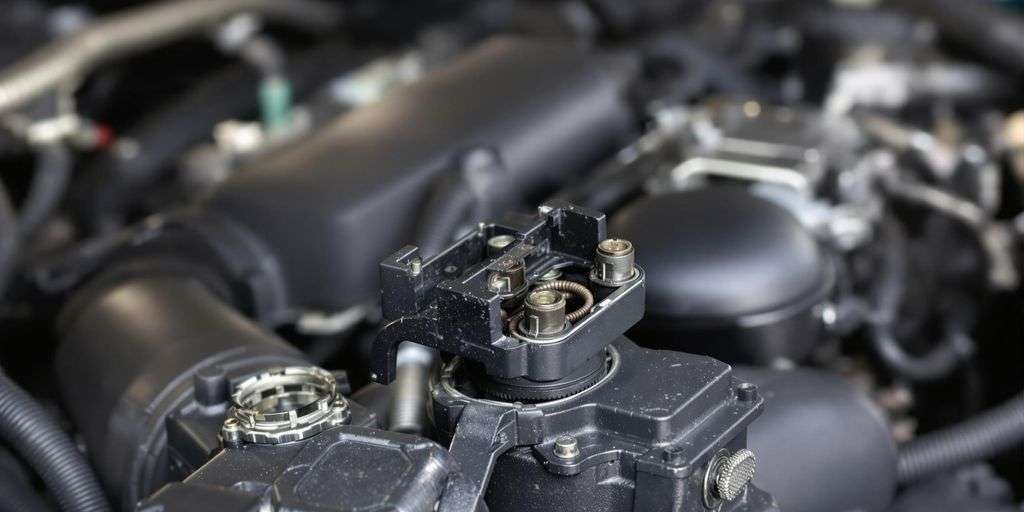Key Takeaways
- Understand the symptoms of a faulty ignition coil, like trouble starting and high fuel usage.
- Prepare your car by fixing minor issues and documenting its condition.
- Be honest about the ignition coil problem when marketing your car.
- Set a fair price considering the car's issues, and be ready to negotiate.
- Explore different selling options, such as dealerships or online services.
Understanding the Challenges of Selling a Car with a Faulty Ignition Coil
Recognizing the Symptoms of a Faulty Ignition Coil
Selling a car with a faulty ignition coil can be tricky, mainly because not everyone knows what to look for. The symptoms are often subtle at first but can escalate quickly. Engine misfires are a common sign, where the car might sputter or hesitate when you hit the gas. Another clue is a noticeable drop in fuel efficiency. Suddenly, you're filling up more often than usual. And let's not forget the dreaded Check Engine light, which seems to have a mind of its own. If it's on, it might be pointing to ignition coil issues.
Impact on Vehicle Performance and Value
A faulty ignition coil doesn't just mess with how your car runs; it can also hit you in the wallet. When the coil isn't working right, the engine struggles, leading to poor performance. You might find your car lacking power, especially when accelerating. This isn't just annoying—it's a red flag for potential buyers. They see a car that's not running smoothly, and they start thinking about repair costs. Naturally, this can lower the car's resale value. Buyers aren't thrilled about taking on a vehicle that's going to need immediate attention.
Legal Considerations When Selling
When you're selling a car with known issues, like a dodgy ignition coil, there's a legal side to consider. You have to be upfront about the car's condition. Transparency is key—buyers need to know what they're getting into. Skipping this step can lead to legal troubles down the line. It's all about disclosure. If you're not sure what you need to tell, it might be wise to consult with a legal professional. They can help you understand what's required in your area, ensuring you stay on the right side of the law.
Preparing Your Car for Sale Despite Ignition Coil Issues
Conducting a Thorough Vehicle Inspection
Before listing your car for sale, it's essential to perform a comprehensive inspection. This helps identify not just the ignition coil issues but any other potential problems that could affect the sale. Start by checking the engine, brakes, tires, and lights to ensure everything is in working order. Don't forget to inspect the interior for wear and tear or any unpleasant odors that might put off potential buyers.
Addressing Minor Repairs and Maintenance
While the ignition coil might be a significant issue, addressing minor repairs can make a big difference in the sale process. Consider fixing small dents, replacing worn-out wipers, and ensuring all fluids are topped up. Regular maintenance, such as oil changes and tire rotations, can also enhance the car's appeal. By taking care of these minor details, you can present your car in the best possible light, making it more attractive to buyers.
Documenting the Car's Condition and History
Transparency is key when selling a car with known issues. Prepare a detailed log of your car's maintenance history, including any repairs related to the ignition coil. This documentation can build trust with potential buyers, showing them that you've taken good care of the vehicle. Include receipts for any recent repairs or maintenance tasks, and be upfront about the car's condition to avoid any misunderstandings later on.
When selling a car with mechanical issues, honesty is your best policy. Buyers appreciate knowing exactly what they're getting into, which can make the negotiation process smoother and more straightforward.
Marketing Strategies for Selling a Car with Mechanical Issues

Highlighting the Car's Positive Features
When selling a car with mechanical issues, it's important to shine a light on what’s good about the car. Focus on the positives like low mileage, a clean interior, or any recent upgrades. Make a list of features that could appeal to buyers, such as a reliable sound system, good fuel economy, or a spacious trunk. Buyers are more likely to overlook mechanical problems if they see value elsewhere.
Being Transparent About the Ignition Coil Problem
Honesty is key. Being upfront about the ignition coil issue can actually build trust with potential buyers. Explain what the problem is and how it affects the car. If you’ve gotten a quote for the repair, share that information too. Transparency can help manage expectations and may even prevent haggling over the price later.
Targeting the Right Audience
Not everyone will be interested in a car with mechanical issues, so aim your marketing efforts at the right crowd. Consider targeting DIY enthusiasts or mechanics who might see the car as a project. Online marketplaces and forums dedicated to car repairs or enthusiasts might be the perfect place to list your vehicle. Craft your ad to speak directly to this audience, emphasizing the potential for a rewarding project or a great deal on a car that just needs a little work.
Selling a car with a known issue doesn’t have to be a headache. By highlighting what’s good, being honest about what’s not, and finding the right buyers, you can still make a successful sale.
Negotiating the Sale of a Car with a Faulty Ignition Coil
Setting a Realistic Asking Price
When selling a car with a known issue like a faulty ignition coil, setting a realistic price is key. Start by researching the current market value of similar vehicles in good condition. Then, factor in the cost of the necessary repairs. It's important to be upfront about the issue and adjust your asking price accordingly. This transparency can build trust with potential buyers.
Handling Buyer Inquiries and Concerns
Buyers will likely have questions about the ignition coil problem. Be prepared to discuss the symptoms and how it affects the car's performance. You might want to mention any mechanic consultations you've had, as this can reassure buyers that you're informed about the car's condition. Addressing concerns openly can ease buyer hesitation and keep negotiations moving forward.
Finalizing the Sale with Confidence
Once a buyer is interested, it's time to seal the deal. Ensure all paperwork is in order and ready for signing. Be confident in your pricing and the car's worth, even with its issues. If you've been honest about the car's condition and set a fair price, you'll likely find a buyer who appreciates the transparency and is willing to take on the repair costs.
Exploring Alternative Selling Options for Cars with Mechanical Problems

Selling to a Dealership or Mechanic
If your car's got an engine hiccup, selling it directly to a dealership or a mechanic might be the way to go. Dealerships often take cars with issues because they have the resources to fix them up. Mechanics might be on the lookout for parts or a project car. Think of it as a trade-off—they get a car to work on, and you get a quick sale without the hassle of private buyers nitpicking every detail.
Considering Online Car Buying Services
Online car buying services have popped up as a convenient option. Services like Peddle, Carvana, and Copart are known for buying cars in less-than-perfect condition. They offer quick quotes and can handle the paperwork, making the process smoother. It's a good choice if you want to avoid the back-and-forth of traditional sales.
Exploring Trade-In Opportunities
Trade-ins can be a smart move if you're planning to get another vehicle. Even if your car isn't running perfectly, dealerships might still offer a trade-in value, which can be applied to your next purchase. It's worth checking out what they might offer, especially if you're already eyeing a new ride.
When selling a car with issues, always weigh your options carefully. Each route—whether selling to a dealer, using an online service, or trading in—has its own set of benefits and considerations. Choose the one that aligns best with your needs and timeline.
Legal and Ethical Considerations When Selling a Car with Known Issues
Understanding Disclosure Requirements
When you're selling a car with mechanical problems like a faulty ignition coil, honesty is key. You must disclose any known issues to potential buyers. This not only builds trust but also protects you legally. Many regions have laws that require sellers to inform buyers about significant problems with the vehicle. Failure to do so can lead to legal consequences, including lawsuits or fines.
Avoiding Misleading Advertising
It's tempting to gloss over the negatives when you're trying to sell a car, but misleading advertising can backfire. Make sure your ads are clear and truthful about the car's condition. This includes mentioning the faulty ignition coil and any other mechanical issues. Transparency helps manage buyer expectations and prevents disputes later on.
Ensuring a Fair Transaction
A fair transaction is beneficial for both parties. Set a realistic price that reflects the car's condition. Be open to negotiations, but don't feel pressured to undersell. It's important to have all paperwork in order, including a bill of sale that notes the car's faults. This documentation can protect both you and the buyer if issues arise after the sale.
Selling a car with known issues can be tricky, but with transparency and fairness, you can find a buyer who appreciates the deal they're getting. It's all about clear communication and setting the right expectations from the start.
Consider exploring ethical and legal considerations when selling a repossessed car. It's crucial for both the seller and buyer to agree on the sale terms, ensuring a smooth transaction.
Conclusion
Selling a car with a faulty ignition coil might seem like a tough task, but with the right approach, it can be done smoothly. Remember, transparency is key. Be upfront with potential buyers about the car's condition, and consider getting a professional assessment to provide them with a clear picture. Pricing your car fairly, considering the cost of repairs, can also make it more appealing. Additionally, exploring options like selling to a mechanic or a dealership that specializes in cars needing repairs might be beneficial. By taking these steps, you can turn what seems like a setback into a successful sale. Good luck!
Frequently Asked Questions
What are the signs of a bad ignition coil?
A bad ignition coil can make your car hard to start, use more gas, and cause the engine to misfire. You might also see the Check Engine light come on or notice the engine is noisy or shaking.
How does a faulty ignition coil affect my car's performance?
If the ignition coil is bad, your car might not run as smoothly. It can lose power, use more gas, and even make strange noises, which can lower the car's value.
Do I have to tell buyers about the ignition coil problem?
Yes, it's important to be honest about any problems with your car, including a bad ignition coil. This builds trust and is often required by law.
Can I sell my car with a bad ignition coil to a dealer?
Yes, you can try selling it to a dealer. They might buy it as-is, but you might get less money than selling it privately.
What should I do before selling a car with a faulty ignition coil?
Get your car checked by a mechanic, fix small issues, and gather all the paperwork about the car's condition and history to show buyers.
How can I make my car more appealing to buyers despite the ignition coil issue?
Highlight the good parts of your car, like low mileage or new tires. Be honest about the ignition coil but focus on the positives too.



